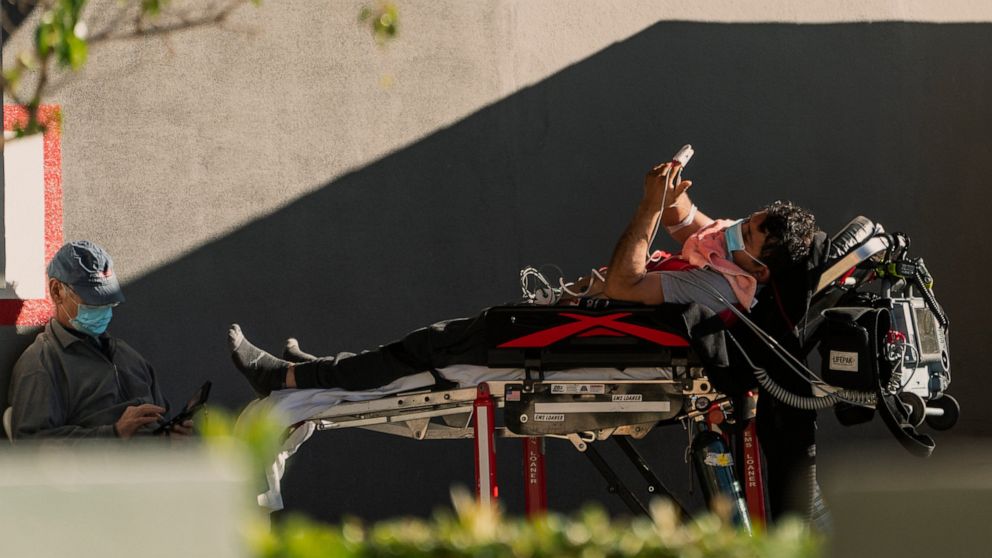
An enormous crush of coronavirus cases in the last six weeks has California’s death toll spiraling ever higher
As of Saturday, nearly 17,400 people were hospitalized with confirmed or suspected COVID-19 infections — more than double the previous peak reached in July — and a state model that uses current data to forecast future trends shows the number could reach 75,000 by mid-January.
More than 3,600 confirmed or suspected COVID-19 patients were in intensive care units. All of Southern California and the 12-county San Joaquin Valley to the north have exhausted their regular intensive care unit capacity, and some hospitals have begun using “surge” space. Overall, the state’s ICU capacity was just 2% on Saturday.
The enormous crush of cases in the last six weeks has California’s death toll spiraling ever higher. Another 272 fatalities were reported Saturday and in the last week nearly 1,600 people died.
In hard-hit Los Angeles County, Director of Public Health Barbara Ferrer implored people to stay home as much as possible, not mingle with others outside their household and wear a mask and social distance when around others.
“Places where people from different households gather and do not follow safety directives contributes to unnecessary COVID-19 spread that results in hospitalizations and deaths that could have been avoided,” she said. “Following the safety measures saves lives and is our only way to protect essential workers and our hospitals.”
LA County health officials announced Saturday they had modified their health orders to comply with recent U.S. Supreme Court rulings calling for places of worship to be allowed to have outdoor and indoor services, with appropriate health safety precautions.
On Saturday night, Apple Inc. announced that it is temporarily closing all 53 of its stores in California because of the coronavirus outbreak. Under the stay-at-home order in effect for nearly the entire state, retail stores are limited to 20% capacity.
As businesses struggle during what should be a very busy holiday shopping season, many hospitals are preparing for the possibility of rationing care. A document recently circulated among doctors at the four hospitals run by Los Angeles County calls for them to shift strategy: Instead of trying everything to save a life, their goal during the crisis is to save as many patients as possible. That means those less likely to survive won’t get the same kind of care offered in normal times.
“Some compromise of standard of care is unavoidable; it is not that an entity, system, or locale chooses to limit resources, it is that the resources are clearly not available to provide care in a regular manner,” the document obtained by the Los Angeles Times reads.
The county’s Health Services director, Dr. Christina Ghaly, said the guidelines were not in place as of Friday night but that they were essential to develop given that the surge has arrived and “the worst is yet to come.”
Many hospitals already have implemented emergency procedures to stretch staff and space.
Corona Regional Medical Center southeast of Los Angeles has converted an old emergency room to help handle nearly double the usual number of ICU patients. It’s using space in two disaster tents to triage ER patients because the emergency room is filled with patients who need to be hospitalized.
In hard-hit Fresno County in central California, a new 50-bed alternate care site opened Friday near the community Regional Medical Center. The beds for COVID-19-negative patients will free up space in area hospitals, where just 13 of some 150 ICU beds were available Friday, said Dan Lynch, the county’s emergency medical services director.
Lynch said he expects they will have to use the Fresno Convention Center, which can accommodate up to 250 patients, given current demand.
Fresno and three neighboring counties also have taken the unprecedented step of sending paramedics on emergency calls to evaluate people. They won’t be taken to the emergency room if they could go to an urgent care facility or wait a few days to talk to their doctors, Lynch said.
Some hospitals have canceled non-essential elective surgeries, such as hip replacements, that might require beds that may soon be needed for COVID-19 patients. Others are increasing staff hours or moving patients to free up space.
"try" - Google News
December 20, 2020 at 12:28PM
https://ift.tt/3nCD2P0
Hospitals try to keep pace, stores close during virus surge - ABC News
"try" - Google News
https://ift.tt/3b52l6K
Shoes Man Tutorial
Pos News Update
Meme Update
Korean Entertainment News
Japan News Update
Bagikan Berita Ini














0 Response to "Hospitals try to keep pace, stores close during virus surge - ABC News"
Post a Comment